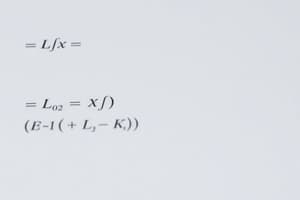Podcast
Questions and Answers
If the exponent is a ______, then the limit is the value of the function evaluated at the given point, if the exponent is a constant times the limit of the exponent, and the function is continuous at the given point.
If the exponent is a ______, then the limit is the value of the function evaluated at the given point, if the exponent is a constant times the limit of the exponent, and the function is continuous at the given point.
variable
If the exponent is a ______, then the limit is the value of the function evaluated at the given point.
If the exponent is a ______, then the limit is the value of the function evaluated at the given point.
constant
If the exponent is a ______, then the limit is the value of the function evaluated at the given point, if the ______ is a constant times the limit of the ______ and the function is continuous at the given point.
If the exponent is a ______, then the limit is the value of the function evaluated at the given point, if the ______ is a constant times the limit of the ______ and the function is continuous at the given point.
logarithm
If the function is a ______ times a trigonometric function, then the limit is the value of the trigonometric function evaluated at the given angle, if the ______ is the limit of the ______ and the function is continuous at the given angle.
If the function is a ______ times a trigonometric function, then the limit is the value of the trigonometric function evaluated at the given angle, if the ______ is the limit of the ______ and the function is continuous at the given angle.
If the function is a ______ of trigonometric functions, then the limit is the ______ of the limits of the individual functions.
If the function is a ______ of trigonometric functions, then the limit is the ______ of the limits of the individual functions.
If the exponent is a constant times the limit of the exponent, and the ______ is continuous at the given point.
If the exponent is a constant times the limit of the exponent, and the ______ is continuous at the given point.
If the function is a product or quotient of trigonometric functions, then the limit is the product or quotient of the limits of the individual functions, if the limits exist.
If the function is a product or quotient of trigonometric functions, then the limit is the product or quotient of the limits of the individual functions, if the limits exist.
This can be done by: 1. Dividing both the numerator and denominator by the highest power of the variable. 2. Factoring out any common ______.
This can be done by: 1. Dividing both the numerator and denominator by the highest power of the variable. 2. Factoring out any common ______.
Evaluating Limits at Infinity can be evaluated by finding the behavior of the function as the variable approaches ______.
Evaluating Limits at Infinity can be evaluated by finding the behavior of the function as the variable approaches ______.
Using Limits to Find Derivatives: The difference quotient is the slope of the tangent line to the function at a given ______.
Using Limits to Find Derivatives: The difference quotient is the slope of the tangent line to the function at a given ______.
By finding the limit of the difference quotient as the change in x approaches ______, the derivative can be found.
By finding the limit of the difference quotient as the change in x approaches ______, the derivative can be found.
Finding Limits Algebraically: If the limit of a constant times a function is a constant, then the limit is the ______.
Finding Limits Algebraically: If the limit of a constant times a function is a constant, then the limit is the ______.
If the limit of a sum or difference of functions is the sum or difference of the limits of the individual functions, then the limit is the sum or ______.
If the limit of a sum or difference of functions is the sum or difference of the limits of the individual functions, then the limit is the sum or ______.
In conclusion, the concept of limits is an important tool in calculus and is used to find derivatives, evaluate functions at points where the function is not defined, and to understand the behavior of functions as the input approaches certain ______.
In conclusion, the concept of limits is an important tool in calculus and is used to find derivatives, evaluate functions at points where the function is not defined, and to understand the behavior of functions as the input approaches certain ______.
Understanding the different types of limits and how to evaluate them is essential for mastering ______.
Understanding the different types of limits and how to evaluate them is essential for mastering ______.
Limits can be used to find derivatives by using the definition of the derivative as the limit of the ______ quotient.
Limits can be used to find derivatives by using the definition of the derivative as the limit of the ______ quotient.
Flashcards are hidden until you start studying
Study Notes
11 commece maths limit
Limits Involving Exponential and Logarithmic Functions
Limits involving exponential and logarithmic functions can be evaluated using the following rules:
- If the exponent is a constant, then the limit is the value of the function evaluated at the given point.
- If the exponent is a variable, then the limit is the value of the function evaluated at the given point, if the exponent is a constant times the limit of the exponent, and the function is continuous at the given point.
- If the exponent is a logarithm, then the limit is the value of the function evaluated at the given point, if the logarithm is a constant times the limit of the logarithm and the function is continuous at the given point.
Limits Involving Trigonometric Functions
Limits involving trigonometric functions can be evaluated using the following rules:
- If the function is a constant times a trigonometric function, then the limit is the value of the trigonometric function evaluated at the given angle, if the constant is the limit of the constant and the function is continuous at the given angle.
- If the function is a sum or difference of trigonometric functions, then the limit is the sum or difference of the limits of the individual functions.
- If the function is a product or quotient of trigonometric functions, then the limit is the product or quotient of the limits of the individual functions, if the limits exist.
Evaluating Limits at Infinity
Limits at infinity can be evaluated by finding the behavior of the function as the variable approaches infinity. This can be done by:
- Dividing both the numerator and denominator by the highest power of the variable.
- Factoring out any common factors.
- Setting the variable equal to infinity and solving for the limit.
Using Limits to Find Derivatives
Limits can be used to find derivatives by using the definition of the derivative as the limit of the difference quotient. The difference quotient is the slope of the tangent line to the function at a given point. By finding the limit of the difference quotient as the change in x approaches zero, the derivative can be found.
Finding Limits Algebraically
Limits can be found algebraically by using the following rules:
- If the limit of a constant times a function is a constant, then the limit is the constant.
- If the limit of a sum or difference of functions is the sum or difference of the limits of the individual functions, then the limit is the sum or difference.
- If the limit of a product or quotient of functions is the product or quotient of the limits of the individual functions, then the limit is the product or quotient.
In conclusion, the concept of limits is an important tool in calculus and is used to find derivatives, evaluate functions at points where the function is not defined, and to understand the behavior of functions as the input approaches certain values. Understanding the different types of limits and how to evaluate them is essential for mastering calculus.
Studying That Suits You
Use AI to generate personalized quizzes and flashcards to suit your learning preferences.




